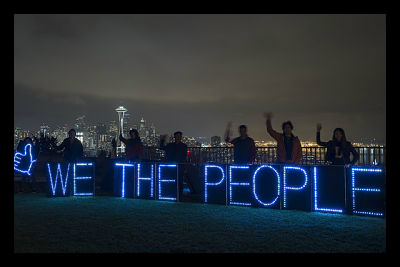Internet Freedom, Intellectual Property and the TPP

U.S. Congress could soon pass legislation to fast-track the embattled Trans-Pacific Trade Partnership (TPP), the Guardian reported Monday, a deal which has divided the Democratic party in the final months of Obama’s two-term presidency. One divisive factor of the controversial deal stems from language used in its chapter on Intellectual Property (IP), which some believe would curb internet freedom by restricting users’ access to copyrighted materials, while increasing penalties for doing so.
Internet freedom advocates argue that the changes made to intellectual property enforcement internationally will inhibit participating countries from enforcing their own, oftentimes shorter copyright terms, while additionally placing further controls upon the fair use exception to copyright law, which The Intercept explained allows individuals to “repurpose copyrighted material to make art or music.”
Negotiations of President Obama’s trademark, albeit controversial deal have been infamously secret, which is one reason prominent political figures from within the President’s own party have voiced their opposition.
On her website, Senator Elizabeth Warren (D-MA) hosts a petition to bring TPP brokerages out from behind closed doors where entities other than corporate lobbyists could access the deal that will affect international environmental policy, labor standards and regulations, as well as intellectual property standards and enforcement.
Pleas for transparency by Warren and her contemporaries were finally quelled by a May 14 Senate vote, which advanced a bill that would grant Obama, and future presidents, sole authority to negotiate the terms of the TPP, Bloomberg reported.
The TPP unites 12 countries with a combined 40 percent of the world’s economy, including some major economic players like Japan, South Korea and Canada, as well as developing countries such as Vietnam and Brunei.
The Electronic Frontier Foundation (EFF), a nonprofit which advocates for freedom of expression and innovation on the Internet, secured a draft of the TPP chapter on intellectual property containing language that would limit users’ “freedom of speech, right to privacy and due process, and hinder peoples’ abilities to innovate.”
Each participating nation will be forced to adopt the TPP’s standards for intellectual property online, which the EFF says goes beyond current U.S. law and lengthens the time an individual or corporation maintains ownership of copyrighted material.
It would also punish alleged copyright infringers by kicking them offline without due process through the termination of their ISP contract. Additional, harsher criminal sanctions, such as jail time without so much as a formal complaint from the copyright holder beforehand, are also a possibility under TPP parameters, the EFF reports.
The EFF also said TPP’s stance on trade secrets–forged as a “tactic to address cyber-espionage on the global stage,”–is nebulous on what exactly constitutes a trade secret, and also lacks any safeguards for journalists or whistleblowers who access information “without criminal or commercial intent.”
The inevitable result, EFF asserts, will be a chilling effect on free and uninhibited expression, which Harvard economist Amartya Sen argues is both the means and the end to development in underdeveloped countries.
Without transparency during the negotiation process, it is difficult to say exactly how restrictive TPP’s IP controls will be. But as of late last month, Sputnik International found that more than 2,354 websites and tech companies had called on users to contact their congresspersons in opposition to the TPP.
– Amanda Burke
Sources: The Guardian, EFF, First Look, Bloomberg, Sputnik News
Photo: Flickr
